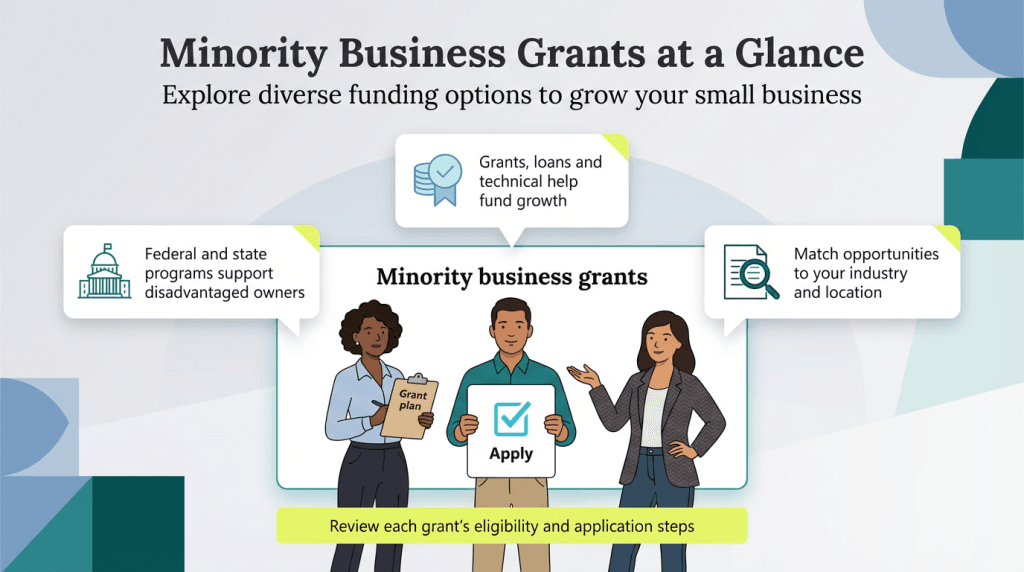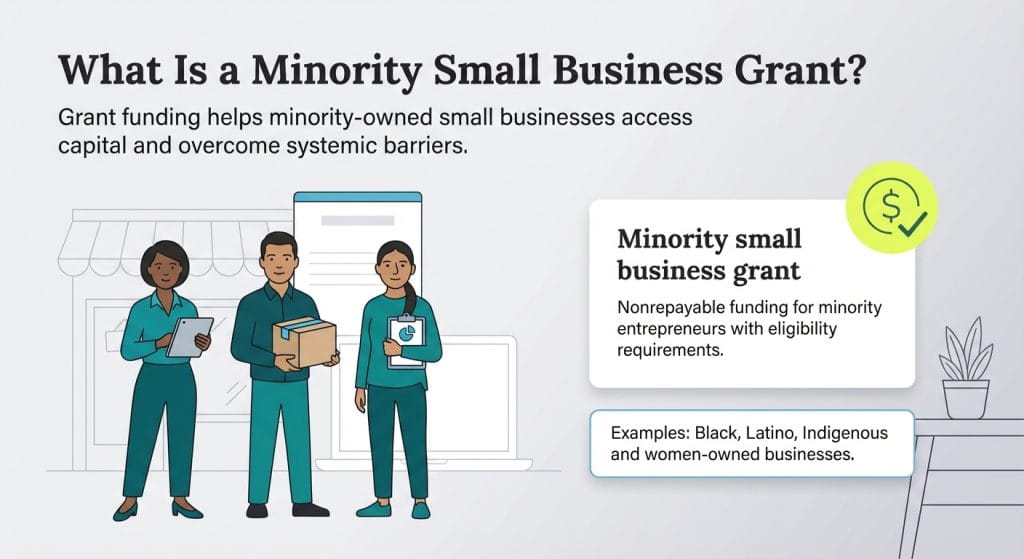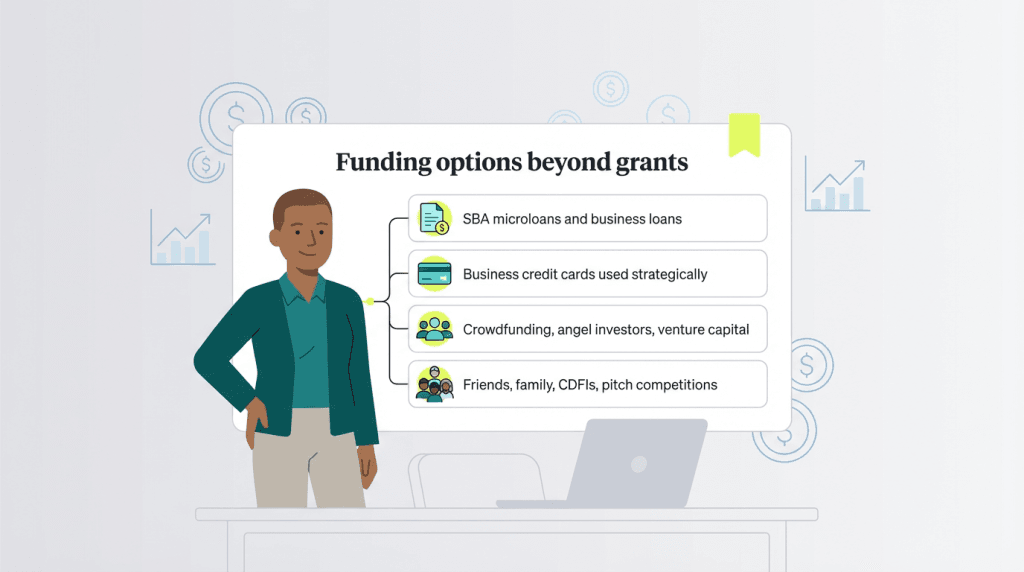Business.com aims to help business owners make informed decisions to support and grow their companies. We research and recommend products and services suitable for various business types, investing thousands of hours each year in this process.
As a business, we need to generate revenue to sustain our content. We have financial relationships with some companies we cover, earning commissions when readers purchase from our partners or share information about their needs. These relationships do not dictate our advice and recommendations. Our editorial team independently evaluates and recommends products and services based on their research and expertise. Learn more about our process and partners here.
18 Small Business Grants for Minorities
Many grants are available for minority-owned businesses. Learn how to take advantage of these grant programs to start or grow your venture.

Table of Contents
Minority-owned small businesses face unique challenges, particularly when it comes to securing capital to start or grow a business. While business loans are always an option, many small business owners prefer to start a business without a loan. Others might not qualify for loans with good repayment terms.
Minority small business grants can be a valuable alternative because they offer funding you don’t have to repay. Here is your guide to business grants for minorities, including the top ones to consider and alternatives to keep in mind.
18 minority business grants

Many minority small business grants and assistance programs exist. However, finding the right one for your business can be challenging. The following grants include prominent and lesser-known programs that may suit your needs. Each has a unique application process and requirements, so carefully review their guidelines to improve your chances of being accepted.
1. Grants.gov
Grants.gov has a running list of more than 1,000 available government grants, including minority business grants. The website compiles grants from over two dozen government agencies, such as the U.S. Small Business Administration (SBA), the U.S. Department of Agriculture (USDA) and the U.S. Department of Commerce.
To find a grant that’s right for your business, use the Search Grants tool on the website to filter the grant list by keyword or opportunity number. Once you locate the grant you wish to apply for, select the hyperlinked opportunity number. There, you will find additional information about the specific grant, as well as any associated documentation you might need.
To apply, visit Grants.gov and register for an account. Then, you can download an application package for that grant. Prepare yourself for a lengthy and specific process.
2. The Minority Business Development Agency
The Minority Business Development Agency (MBDA) is operated by the U.S. Department of Commerce; it’s dedicated to helping minority-owned businesses access the resources they need to grow and succeed.
Grant competitions change regularly. Visit the MBDA Grants website for information on current opportunities. The MBDA’s grant budget was increased under the American Rescue Plan Act, providing an additional $100 million for technical support of underserved entrepreneurs.
3. Backing the B.A.R. Grant
Backing the B.A.R. Grant is a collaboration between the NAACP and Bacardi; it’s intended to increase the representation of minorities in the beverage, alcohol and hospitality industries. It awards over $100,000 in acceleration grants; also, it provides education, support and solutions for Black-owned bars, restaurants, nightclubs, liquor stores and small businesses applying for a liquor license. Eligible businesses will be majority-owned by Black individuals and must either have a liquor license or currently be seeking one. Each year, the organization awards 10 grants of $10,000 apiece.
Visit Backing the B.A.R. to apply for a grant.
4. NAACP Powershift Entrepreneur Grant
The NAACP Powershift Entrepreneur Grant was developed to support Black entrepreneurs and Black-owned businesses through a variety of funding opportunities and other resources. This year’s annual grant — which is the fourth of its kind — was launched in conjunction with Medium Rare and The Shark Group.
Winners will receive a $25,000 grant and a variety of resources to help the businesses thrive. You can start applying on October 24, and applications close on November 1.
“We invite aspiring and established Black entrepreneurs to seize this opportunity and join us in shaping a brighter future for all,” said Yumeka Rushing, chief strategy officer at the NAACP. “The NAACP remains committed to fostering economic growth and sustainability for Black communities.”
To learn more and apply, visit the NAACP’s grant page.
5. The National Minority Supplier Development Council’s Business Consortium Fund
The National Minority Supplier Development Council (NMSDC) provides a grant program known as the Business Consortium Fund, which aims to support certified minority-owned businesses. To become a certified minority-owned business with the NMSDC, minority business owners must own and control at least 51 percent of the business.
Minority business owners include entrepreneurs who are African American, Hispanic American, Native American, Asian Pacific American or Asian Indian American.
Through the NMSDC, certified minority-owned businesses can access working capital loans and grant funding through the Business Consortium Fund; this is an organization of suppliers and vendors associated with the NMSDC. To learn more, visit NMSDC.
6. The U.S. SBA 8(a) Business Development Program
The U.S. SBA 8(a) Business Development Program aids economically disadvantaged small business owners. It provides business development support and consultation services for management.
To qualify, the business must be 51 percent owned and controlled by an entrepreneur who is economically and socially disadvantaged and has a net worth of $250,000 or less. For a more specific definition of what constitutes “economically and socially disadvantaged,” see Title 13 of the Code of Federal Regulations.
To apply for support through the SBA 8(a) Business Development Program, you must first be certified by the agency. To do so, visit SBA Certify, create a profile and follow the steps outlined. You will receive correspondence via mail to confirm whether you were approved for certification.
Once accepted into the program, your certification will last up to nine years. However, certified businesses must complete annual reviews to remain in good standing with the program.
7. The U.S. SBA Program for Investment in Micro-Entrepreneurs
The Program for Investment in Micro-Entrepreneurs (PRIME) provides various grants to small businesses; it offers priority to women-owned businesses and economically and socially disadvantaged business owners. These grant opportunities include the following:
- Technical assistance grant: This grant offers training and technical assistance to micro-entrepreneurs.
- Capacity-building grant: This grant extends training and scaling support to micro-entrepreneurs and offers assistance for expanding services.
- Research and development grant: This grant assists research and development efforts and the establishment of best practices for technical development in micro-enterprises.
- Discretionary grant: The U.S. SBA determines recipients of discretionary grants based on whether organizations are consistent with PRIME’s goals.
According to the SBA, the following types of organizations are eligible for a PRIME grant:
- A micro-enterprise development organization or program with a demonstrated record of delivering micro-enterprise services to disadvantaged micro-entrepreneurs
- An intermediary, such as a private, nonprofit entity serving micro-enterprise development organizations
- A micro-enterprise development organization or program that is accountable to a local community, working with a state or local government or an Indian tribe
- An Indian tribe acting on its own if it can certify that no private organization or program exists within its jurisdiction
Visit the PRIME 2025 announcement for more information.
8. State Small Business Credit Initiative (SSBCI) Technical Assistance
The American Rescue Plan reauthorized and allocated $200 million to the SSBCI. This money is sent to and allocated by the states, territories and tribes that choose to participate.
The grants are for technical assistance, including legal, accounting and financial help. They are available to businesses owned by socially and economically disadvantaged individuals and very small businesses.
To apply, contact the SSBCI agency in your state, territory or tribe, which you can find on the Council of Development Finance Agencies website.
9. The USDA Rural Business Enterprise Grant Program
The USDA’s Rural Business Enterprise Grant Program provides grants to public entities to offer training and technical support to small businesses with fewer than 50 new workers and less than $1 million in gross revenue.
Unlike many other grants on this list, the USDA Rural Business Enterprise Grant is awarded to public entities, such as towns, state agencies, nonprofits or universities. They then use the grant to support local small businesses within rural communities.
These grants can be used for a wide range of purposes, including the following:
- Training and technical assistance, such as project planning, business counseling and training, market research, feasibility studies, professional or technical reports, and producer service improvements
- Acquisition or development of land, easements or rights of way; construction, conversion and renovation of buildings; plants, machinery, equipment, access for streets and roads; parking areas and utilities
- Pollution control and abatement
- The capitalization of revolving loan funds, including funds intended for startups and working capital
- Distance adult learning for job training and advancement
- Rural transportation improvement
- Community economic development
- Technology-based economic development
- Feasibility studies and business plans
- Leadership and entrepreneur training
- Rural business incubators
- Long-term business strategic planning
Visit USDA’s Rural Business Enterprise Grant Program for more information.
10. FedEx Small Business Grant Contest
Minority entrepreneurs and small business owners can apply for the annual FedEx Small Business Grant Contest, in which 12 businesses can win up to $50,000 each.
- The grand prize is $50,000, plus $7,500 in FedEx printing services.
- The second-place prize is $30,000, plus $5,000 in FedEx printing services.
- There are 10 third-place prizes of $15,000, plus $1,000 in FedEx printing services.
To apply, visit the FedEx Small Business Grant Contest page. You’ll write a short profile about why you started your business, what the company does and what makes your company different; you’ll also include any social causes your business embraces and how you plan to use your grant money to improve your business. You may also include video content in the form of a one-minute YouTube video about your company and its mission.
11. Amazon Black Business Accelerator
The Amazon Black Business Accelerator is not exactly a grant program. However, it does offer most Black-owned businesses valuable services for their Amazon stores that they would otherwise have to pay for. These benefits include a $500 enrollment credit, free imaging services for up to 50 products, advertising credits and $1,000 in Buy with Prime credits.
To enroll, you must have a Professional selling account with Amazon. Also, you must have a certificate for your Black-owned business from the U.S. System for Award Management, SBA or National Minority Supplier Development Council. Educational resources are available through Amazon’s Amplify program; enrollees get a Black-owned business badge to display on product detail pages.
To apply, log in to your Amazon Professional selling account, upload your certificate and enroll in the Black Business Accelerator. Visit Amazon’s Black Business Accelerator page for more information.
12. Wish Local Empowerment Program
The Wish Local Empowerment Program gives grants of between $500 and $2,000 to Black-owned brick-and-mortar stores with 20 or fewer employees and annual revenue of less than $1 million. Grant recipients are required to join Wish Local, a mobile shopping app. About 4,000 grants are given each year.
To apply, visit the Wish Local Empowerment Program.
13. Hawai’i FoundHer
The Hawai’i FoundHer program provides grants to women business owners in Hawai’i’s local economy in the tech, fashion, health and wellness, restaurant and keiki/education sectors. To qualify, the business must be majority-owned by Native Hawaiian, Pacific Islander and/or Asian women. The program is six months long, and seven recipients will be selected.
In addition to $20,000 in grant money, founders receive $4,000 for childcare, weekly educational workshops, a national mentor network, and monthly networking and learning retreats.
Visit Hawai’i FoundHer to apply.
14. Ingredients for Success Entrepreneurs Initiative
The Ingredients for Success Entrepreneurs Initiative is funded by Famous Amos and the National Black Chamber of Commerce. It involves a pitch competition with three $50,000 grants awarded to Black small business owners. To qualify, businesses must be at least 90 percent Black-owned and headquartered in the U.S. (not including U.S. territories). Priority is given to businesses operating for five years or less.
Visit the Ingredients for Success Entrepreneurs Initiative to learn more and apply.
15. BGV Pitch
BGV Pitch gives Black female business owners the opportunity to compete for one of three grants by giving their best three-minute pitch to a live audience. First place wins $15,000, second wins $10,000 and third place wins $5,000. The funds are crowdsourced from the Raisify.co audience. In addition, winners get membership in the BGV Connect Incubator, direct funding, access to a network of business owners and investors, free access to Canva for one year and discounts on HubSpot.
Pitch competitions are city-specific — Austin, Chicago, New York and Los Angeles — and have varying deadlines. Businesses must be located in the city where they apply. Apply to pitch on the BGV Pitch page.
16. Freed Fellowship Grant
Freed Fellowship Grants are awarded monthly to underrepresented and overlooked small business owners. Grant recipients become Freed Fellows, and one Fellow is selected at the end of the year for a $2,500 grant.
While any micro or small business owner in the U.S. is eligible, women, minorities, and others who are considered underrepresented or overlooked are given priority. In addition to the grant money, recipients get a free strategy call with business experts, a one-year membership to the Freed Studio online mentorship community and a feature in the Freed Stories podcast.
Visit Freed Fellowship to apply — there’s a $19 application fee.
17. Feed the Soul Foundation’s Restaurant Business Development Grant Program
The Feed the Soul Foundation’s Restaurant Business Development Grant Program awards $15,000 to marginalized professionals in the culinary industry. Funding is provided by corporations. In addition to grant money, the award includes two months of small business financial education and consulting. Also included are one month of marketing and advertising training for culinary businesses and three months of business development consulting.
Eligible businesses include restaurants, food trucks, bakeries, bars, lounges, pop-up food stands and ghost kitchens. Businesses must be at least 51 percent owned by a person or people who identify as marginalized, and it must be located in the U.S. or Puerto Rico. In addition, applicants must be in operation for at least 24 consecutive months before applying and have more than four employees.
Visit Feed the Soul to apply.
18. America’s Top 100 Small Businesses
This grant, funded by the U.S. Chamber of Commerce, awards $2,000 to 10 businesses and $25,000 to America’s Top Small Business of the Year. Applicants can enter in up to five categories from the following list:
- Growth accelerators
- Micro-business leaders
- Customer champions
- Digital innovators
- The disruptors
- Community champions
- Champions of adaptability
- Global stars
- Enduring businesses
- Culture champions
In addition to the grant money, all 100 businesses selected get brand exposure, access to top business experts and thought leaders, and VIP perks. Visit CO-100 to apply.
What is a grant?
A grant is a funding source recipients don’t have to repay. They typically have lengthy and specific application processes and eligibility requirements. Since completing grant applications can be complicated, many business owners hire professional grant writers to help. The organization issuing the grant will select recipients from numerous applications.
Editor’s note: Looking for the right loan for your business? Fill out the below questionnaire to have our vendor partners contact you about your needs.
Grant funding can help businesses avoid or reduce reliance on business loans or other funding sources, such as venture capital. Even the best business loans charge interest and must be repaid. However, while grants are often considered free money, they require a significant investment of time and effort — plus, the funding is never guaranteed.
Government grant programs are available for economic development; private and nonprofit organizations also create grant programs.
What is a minority small business grant?

A minority small business grant is specifically designed to help minority-owned small businesses grow and succeed. “Minority business grants are funding programs specifically created to support entrepreneurs from marginalized communities, such as Black, Latino, Indigenous and other people of color — those who often face systemic barriers to accessing capital,” said Dr. Sheila Hill, executive director and co-founder of Think Big.
Minority-owned businesses come in numerous varieties, and grants are available for many of them. For example, there are many business grants for Black women entrepreneurs and Hispanic business owners. Other grants are available for women-owned businesses, businesses owned by Indigenous people and entrepreneurs with disabilities.
However, keep in mind that these grants do have some stipulations. “A major misconception is that grants are simply ‘free money’ with no strings attached,” Hill said. “While repayment isn’t required, many grants come with conditions — including application requirements, documentation and reporting.”
Alternatives to small business grants

If you are unable to get a small business grant or need more funding, consider the following grant alternatives:
- SBA microloans: The Small Business Administration backs loans up to $50,000 for small businesses. The average SBA microloan is around $13,000. They are usually administered by nonprofit intermediary lenders, who often provide management and technical assistance. Read the SBA’s microloans information online.
- Business credit cards: A business credit card is an immediate, although expensive, source of small business funding. Be careful and use business credit cards wisely to avoid excessive interest payments.
- Business loans: Businesses and owners with good credit may qualify for a business loan. There are different types of business loans — choose one that is right for you.
- Crowdfunding: You may be able to get the capital you need for your business through a crowdfunding site. Some sites raise money that must be repaid, while others help you gather individual grants or investments.
- Angel investors or venture capitalists: You can get the capital you need for your business by taking on an angel investor or venture capitalist as an equity partner.
- Friends and family: If you have friends or family with money to lend or invest, you can pitch your business idea to them to get some working capital.
- Community Development Financial Institutions (CDFIs): Many minority-owned small businesses can secure funding and/or resources through CDFIs. These institutions offer grants and programs to underrepresented communities and organizations to support minority entrepreneurs and mission-driven organizations.
- Pitch competitions: Many organizations provide pitch competitions for minority-owned businesses. Winners can receive opportunities for funding, business growth, mentorship and other resources.
Minority business grants FAQs
- Research: First, research available grant opportunities and ensure they're available. If you miss the deadline, you'll have to wait until the following year to apply.
- Check eligibility requirements: Determine if you meet all the grant's qualifications before applying.
- Gather required documentation: Your application will outline the documents you must include. For example, you may need to submit business registration documents, financial statements, tax returns and business plans. Gather these documents ahead of time to streamline the grant application process.
- Write your grant proposal: Your grant proposal will state why you should be awarded the grant. It will outline your business idea, its potential impact on jobs and the community, and why it deserves funding.
- Complete and submit the application: Follow the instructions on accurately completing and submitting your grant application.
Sammi Caramela and Jennifer Dublino contributed to the reporting and writing in this article.





